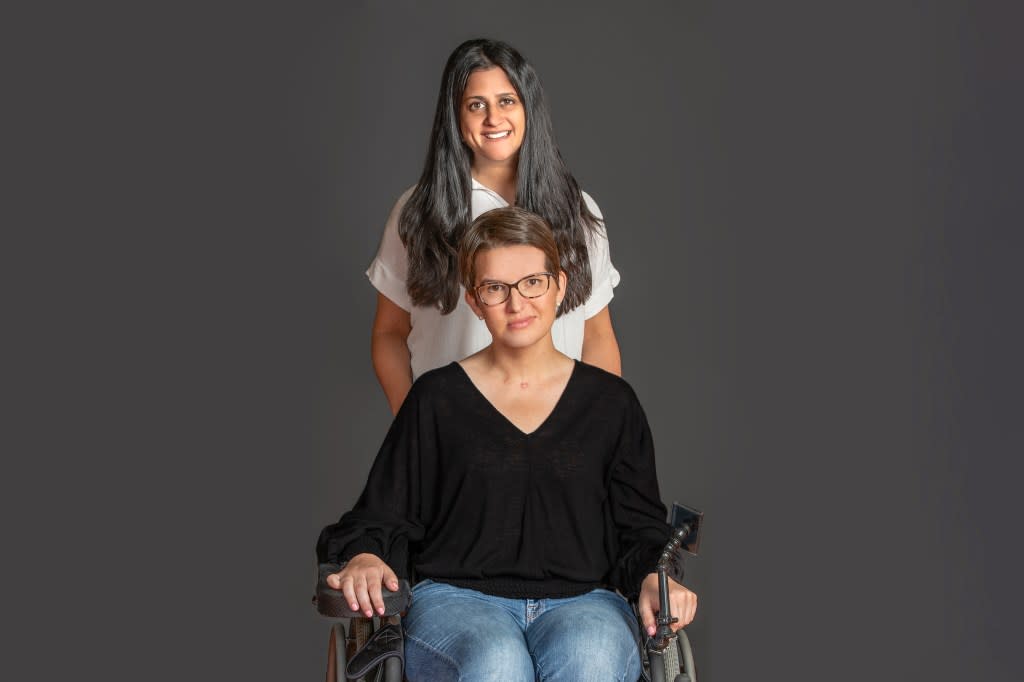The founder of a $4.4 billion unicorn had a stroke at age 34. It altered her life—and reshaped the mission of her startup
Good morning, Broadsheet readers! Disney Entertainment co-chair Dana Walden is reportedly among the top candidates to succeed Disney CEO Bob Iger, ESPN ad revenue for this year's women's March Madness tournament doubled, and the founder of the $4.4 billion startup Guild navigated a year of personal and professional challenges. Have a thoughtful Tuesday.
- Life lessons. Last August, Rachel Romer was at home on her outdoor patio in Denver, Colo. The founder of Guild, the $4.4 billion education and upskilling startup, had just driven her twin girls home from their last day of preschool; they were next door at their father’s house for the night. The next morning, Romer’s aunt walked past and found Romer collapsed outside. She’d had a stroke days before her 35th birthday.
Months of rehabilitation followed: three brain surgeries and three months in hospitals and inpatient rehab. Romer had a “flipped brain,” which meant that, unlike most stroke survivors, she retained the ability to speak—in a more monotone voice than before—and understand others. She held onto her IQ and knowledge. But her right arm and right leg were paralyzed.
“It’s been a time for a lot of reflection,” Romer told me in an interview yesterday. While she was hospitalized, her grandmother died and her daughters started kindergarten. Before her stroke, she’d been through a divorce. She connected with other young women who’d had strokes and learned more about the warning signs and risk factors. (She urges everyone to learn the stroke symptoms acronym "BE FAST.") Her mother, father, and two younger sisters took time off of work through the Family and Medical Leave Act to help care for her.
A stroke is a life-altering event for anyone. For a founder who worked nonstop to build a business valued at $4.4 billion by the age of 34—one of the world's most valuable female-founded businesses—it was perhaps an even more drastic change. Romer has been navigating life in a wheelchair and adhering to a complete “digital detox,” with minimal screen time. (For months, that meant no email at all but some work via phone calls and FaceTime.) “I’ve been playing catchup on things I missed and really focusing in on family,” Romer says.
And yet the future of Guild—the company Romer spent her 20s and 30s building—was just as important to her. When she woke up in the hospital, Romer saw her dad across the room and said to him, “Somebody call Bijal.” That was Bijal Shah, then Guild’s chief experience officer. Shah was out on maternity leave and dealing with some postpartum medical challenges of her own. She agreed to come back from parental leave five weeks early to serve as Guild’s interim CEO while Romer recovered. “I wanted to ensure she could come back in and take over when it made sense for her,” Shah says. “I didn’t think there was a different answer.”

Guild announced today that Shah is taking on the CEO title permanently while Romer continues to focus on her recovery. Romer says she’s been “processing how to totally hand over the baton.” These days, Romer does therapy at a hospital a few times a week as she works to regain mobility on her right side. She plans to support Shah, work with major Guild customers like Walmart and Disney, and serve on Guild's board of directors.
Romer’s experience will influence Guild’s focus moving forward. Best known for providing education benefits for corporate partners and their hourly workforces, Guild now sees itself at the center of reskilling the workforce in response to AI. It’s expanded to industries including health care, which Romer saw the need for this year. “I saw the nursing shortage right up close,” she says.
Romer says that putting plans in place for her parental leave more than five years ago—that was when she hired Shah—unintentionally prepared Guild for this curveball. "Having a deep bench of leaders beneath you is what protects your business for a moment like this," Romer says.
Shah describes Romer as “an optimist—and an opportunist” who can find meaning and new business ideas through her medical challenges. “I’m a glass-half-full person,” Romer says. “I’ve really tried to cherish the learnings of this experience. I really think they will impact the rest of my life.”
Emma Hinchliffe
emma.hinchliffe@fortune.com
The Broadsheet is Fortune's newsletter for and about the world's most powerful women. Today's edition was curated by Joseph Abrams. Subscribe here.
This story was originally featured on Fortune.com
